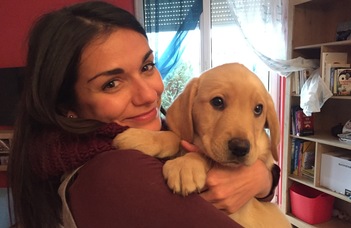Social referencing in dog puppies

Puppies rely on information provided by humans and by their mother when setting out to explore their world.
Imagine entering a room where on the floor lies a strange object that you had never seen before. If you find yourself in this situation with a friend, you would probably look at him/her to see his/her reaction. If s/he would appear suspicious or scared, you would probably stay away from the object and maybe even get out of the room; but if s/he looks comfortable, then you would stay and investigate the strange object. It turns out that dog puppies do the same.
Researchers of Family Dog Project working at the Department of Ethology at Eötvös Loránd University, Budapest discovered that dog puppies as young as 8-week-old acquire information about a new situation relying on the emotional displays of a social partner. “This process is called social referencing” explains lead researcher Claudia Fugazza. “Social referencing is composed by two behavioural elements. The first is referential looking, that is gaze alternation between the new object and the social partner, probably to look for information. In the example, gazing at the strange object and then at your friend”, continues Dr. Fugazza. “The second element is behavioural regulation, that is behaving according to the emotional signals expressed by the social partner. In our example, approaching or avoiding the new object depending on whether your friend looks comfortable or frightened”.
The new study, just published in Animal Behaviour, found that dog puppies look for information about a novel situation from conspecific social partners and also from humans, and modify their behaviour towards the new stimulus according to the emotional signals expressed by the human social partner.

The researchers tested 48 dog puppies of various breeds by exposing them to objects that were new for them: a fan with ribbons attached to it and a strange object making noise - in presence of human or conspecific social partners. The scientists discovered that puppies alternated their look from the object to the social partner and approached more the object when the human partner showed positive emotional signals towards it than when she behaved neutrally. Not only. The puppies were also exposed again to the same situation after a delay of 1 hour, but this time they were tested alone. The results showed that they still behaved in line with the emotional signals that the social partner expressed in the previous occasion. “Puppies had acquired some information about the stimulus during the first exposure with the social partner and recalled it using their memory, to behave appropriately when later exposed to the same situation” explains Ákos Pogány, co-author of the study.
To test whether puppies would behave similarly in presence of their mother or of another dog, the researchers also exposed them to the new situations either with their mothers or with an unfamiliar conspecific. Similar to human infants, the puppies approached the new stimulus more in presence of their mother than in presence of the unfamiliar dog, suggesting that the mother acts as a secure base for exploration of novel stimuli.
“The early development of social referencing in dog puppies may have important applied consequences, because the owners’ attitude in novel situations may affect the puppies’ future behaviour in similar situations” explains Ádám Miklósi, co-author and head of the Department of Ethology. “Owners should take the opportunity to spend time with their puppies to show the world to them, because these experiences may have an impact in how newly-adopted puppies perceive their new environment and learn about it”.

